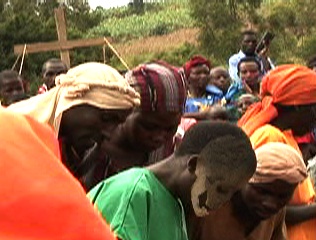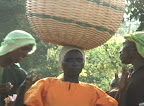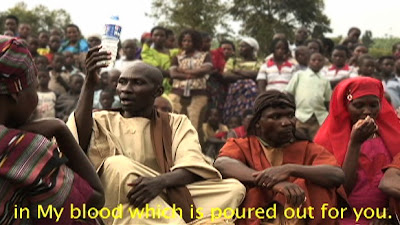All of the actors in the Lazarus scene come from families that have been directly affected by the AIDS virus. In fact, no family has been able to escape the disease in Kiwangala. Funerals are held in the village on a weekly basis. It sounds grim, but Ugandans have told me time and again that they are making progress in fighting the disease and thing are getting better. In the past someone infected would be dead in a month. Nowadays, antiretroviral drugs, or ARVs, can keep someone alive for years. The phenomenon is called the Lazarus effect. I met one woman who had been HIV positive for 15 years and still led a healthy and productive life.
 The problem of the epidemic now is the false sense of security individuals get from believing that the disease has become benign. Young people think that if they get infected they can just take ARVs. This has led to an increase in risky sexual behaviors and infection rates are now back on the rise. On top of that, HIV/AIDS therapy is heavily subsidized by foreign aid. One of the biggest players in Uganda has been the American government's P.E.P.F.A.R. The President's Emergency Plan For AIDS Relief is a $63 billion worldwide initiative started by President Bush. However, while the epidemic is still growing in Uganda, a cap has been put on P.E.P.F.A.R. funds and doctor's are now forced to send away patients. This is compounded by the hesitancy of private donors to give more in the economic recession and local corruption. If things continue this way the battle against AIDS in Uganda could become one step forward and two steps back.
The problem of the epidemic now is the false sense of security individuals get from believing that the disease has become benign. Young people think that if they get infected they can just take ARVs. This has led to an increase in risky sexual behaviors and infection rates are now back on the rise. On top of that, HIV/AIDS therapy is heavily subsidized by foreign aid. One of the biggest players in Uganda has been the American government's P.E.P.F.A.R. The President's Emergency Plan For AIDS Relief is a $63 billion worldwide initiative started by President Bush. However, while the epidemic is still growing in Uganda, a cap has been put on P.E.P.F.A.R. funds and doctor's are now forced to send away patients. This is compounded by the hesitancy of private donors to give more in the economic recession and local corruption. If things continue this way the battle against AIDS in Uganda could become one step forward and two steps back.On a lighter note, we come to the most exotic element in The Revealed Truth: the donkeys. The entire time I was in Uganda I saw just one horse. I've never figured out why there are so few there. It could be that there were never any wild horses in Africa, but they weren't in North America either and here they've flourished. I thought for sure that the British would bring some equines along with them to build their colonies. Maybe it has something to do with the equatorial tropical environment of the or that Uganda's such a small country that there's no need to travel long distances. Who knows. They're just not here.
 The play's were striving for authenticity and imported these donkeys from Kampala. They became a spectacle in the village and drew a crowd even before the play started. People would gather around and shriek in awe at the sight of the beasts. It's was like when we go to the zoo in America and see the elephants for the first time. One woman asked if I feared the animals. I told her no. Then she asked me if I eat them in my country. I played the part of a good ambassador and replied in the negative. I didn't want to go into what goes on at the Jello factory. I do know that they eat donkey in other parts of Africa. I discovered that at an all you can eat Ethiopian restaurant in Kampala when I asked the waiter about the mystery meat at the buffet. Fish and grasshoppers aside, I don't care to eat meat so I can't give a review on the taste of donkey, but I can tell you that it looked a lot like ground beef.
The play's were striving for authenticity and imported these donkeys from Kampala. They became a spectacle in the village and drew a crowd even before the play started. People would gather around and shriek in awe at the sight of the beasts. It's was like when we go to the zoo in America and see the elephants for the first time. One woman asked if I feared the animals. I told her no. Then she asked me if I eat them in my country. I played the part of a good ambassador and replied in the negative. I didn't want to go into what goes on at the Jello factory. I do know that they eat donkey in other parts of Africa. I discovered that at an all you can eat Ethiopian restaurant in Kampala when I asked the waiter about the mystery meat at the buffet. Fish and grasshoppers aside, I don't care to eat meat so I can't give a review on the taste of donkey, but I can tell you that it looked a lot like ground beef.Speaking of strange dinners, we've finally come upon one of the strangest Last Suppers I've seen. It's also one of my favorites because of it's unintended humbleness. Like Veronese's Feast in the House of Levi mentioned in the introductory post of this series, this Last Supper has a carnival atmosphere. Jesus can hardly be heard over the whirr of the generator, squaking of the intercom, and snickering of the crowd. The disciples dig into a bag of bread. Ugandan bread is bland probably has the same consistency of the unleavened bread that was broken at the original Last Supper.
Instead of a chalice of wine, Jesus passes around an old plastic bottle of Rwenzori brand drinking water. This could be a message of temperance. The Born Again churches that I worked with didn't drink alcohol. Maybe the director of the play was trying to downplay an mention of wine whatsoever. The reason for this prohibition also might have something to do with Uganda being the number one consumer of alcohol per capita in the world. Bars are open twenty four hours and local brew is potent and plentiful. Vodka is served doubleshot size in a plastic baggie and costs about a 30 cents each. I've seen old men drunk in the street at 8AM and a two year old throwing a tantrum until his mother soothed him with a bottle of waragie. There's reason to be afraid of liquor. I once asked a girl from the church out to a neighborhood housewarming party. She declined telling me that she doesn't go to discos. There would be drinking and even dancing there. It was the equivalent of "Sorry, I'm washing my hair tonight".
The Revealed Truth Blog Series
This post is the sixth of a nine part series that takes an in-depth look at the The Revealed Truth and how rural Ugandan culture influenced the making of the film. The movie is about an hour long but I've broken it down into 5 to 10 minute blog-size episodes. The next post will feature Jesus's arrest.

The previous post was The Revealed Truth Part 4: Let The Little Children Come to Me.













0 comments:
Post a Comment